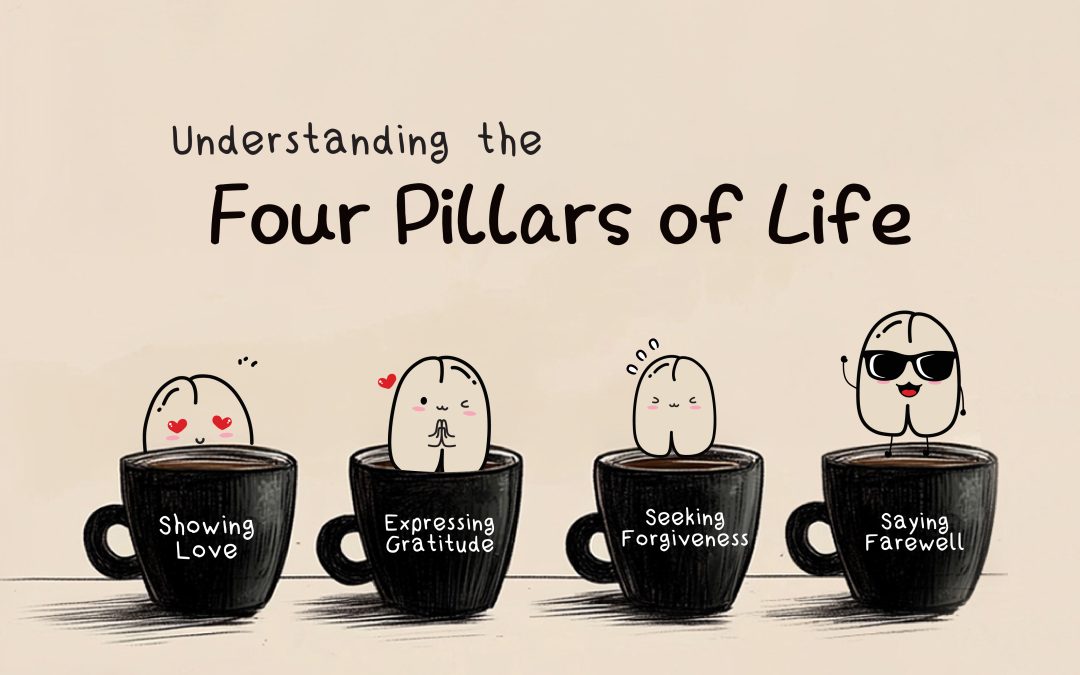The Four Pillars of Life originally served as a guiding principle for individuals to reflect upon their journey as they come to the end of life. These four essential actions—expressing gratitude, seeking forgiveness, showing love, and saying farewell—were meant to help people find closure and peace before passing. Over time, various associations and organizations have actively promoted these values, encouraging families to support their elders in resolving past grievances and making peace with themselves and the world while they are still lucid and able. This allows them to depart with a heart full of gratitude and without regrets.
From a young age, we often hear these words, “birth, aging, illness and death,” suggesting that life follows a natural order. However, a casual glance at the obituary display updated daily at Nirvana Center Kuala Lumpur’s lift lobby, reveals names that include both men and women, as well as those of the young and the elderly. The shocked and grief-stricken expressions of families caught off-guard arriving at funeral parlours are clear indications that not everyone departs life in a predictable manner. Reflecting on departed loved ones, those who found themselves faced with their own mortality are more often than not overwhelmed. Those who had to watch over them were similarly affected—if not worse—wishing they had expressed more before it was too late. This is why we should begin putting the Four Pillars of Life into practice, regardless of where we are in life—rather than waiting for old age or our final days.
The Four Pillars of Life often appears like a set sequence—starting with “expressing gratitude, seeking forgiveness, showing love,” and with “saying farewell” as the final step. Perhaps it is because goodbyes often evoke a sense of melancholy and regret, that people are reluctant to face it. However, if we view the Four Pillars as a lifelong practice, we should allow each of these four aspects to manifest freely, without the perceived rigid sequencing. This implies that any of the four aspects can be revisited randomly at any time depending on the circumstances and needs of the situation.

The Four Pillars: The Bearing of the Pillars
The Four Pillars of Life—expressing gratitude, seeking forgiveness, showing love and saying farewell—seems simple in theory, yet it is not always easy in practice. For children, these actions come naturally; for adults however, somewhat less so. Polite expressions such as “thank you” or “sorry” exist in our daily interactions, but the difference lies in depth. In casual exchanges, these words convey courtesy; in the Four-Fold Path, they strengthen emotional bonds. This distinction is often why adults, especially those unaccustomed to expressing emotions, struggle to verbalize their feelings, eventually forgetting the importance of these four actions.
What makes the Four Pillars so impactful is not merely saying the words, but ensuring they are spoken at the right time, to the right people, with sincerity. When infused with meaning, these simple phrases become powerful and transformative.
Thus, the Four Pillars is not just about saying “thank you,” “goodbye,” “I’m sorry,” or “I love you.” It can take the form of a heartfelt conversation, a written letter, or even a simple gesture. As long as the speaker is sincere and the listener is receptive, these four actions become the most natural and healing practice in everyday life.
No Regrets, We’ve Always Had the Most Beautiful Moments
Remembering all those we have loved and lost, many of us share the same realisation—we have already shared our last moments with countless people without even knowing it. Every conversation, every exchange, and every interaction may have been the final farewell. It is the words and gestures contained within the Four Pillars that we have shared in daily life that become the most lasting and beautiful images in our memories.
- Express Gratitude – Thank the people, experiences, and moments that have shaped your life.
- Say Farewell – Cherish today’s memories and embrace tomorrow’s uncertainties with peace.
- Show Love – If you love, let it be genuine—break the habit of saying words you don’t mean.
- Seek Forgiveness – Healing begins when we say, “I’m sorry” and “I forgive you,” even for unseen wounds.
The difference between columbarium and mausoleum
The difference between columbarium and mausoleum The words columbarium and mausoleum are sometimes used interchangeably but both terms actually refer to very distinct memorial structures. The mausoleum (or mausolea in plural) has always been associated with the...
Memorial options for cremations
Memorial options for cremations Upon cremation, the ashes or “cremains” are usually collected by the crematorium and returned to the family in an urn. At this stage, it is up to the bereft family to decide on how to memorialise their loved one. Professional...
Columbaria and cremation niches
Columbaria and cremation niches A columbarium is a construct used for the storage or final resting place of cremated remains in cinerary urns. They can be free standing structures, or part of a building with many niches resembling dovecotes. In fact, the term...
Burial versus cremation
Burial versus cremation When referring to burial or cremation, this usually relates to the final stage of the funeral involving the disposition of remains. In burial, the remains are interred whole below ground in a cemetery or in some cases, a crypt or mausoleum. In...
The Funeral
The Funeral Funerals tend to be very spiritual in nature and are generally dependent on the deceased’s cultural and religious background. The customs and practices may vary from place to place even for similar religions. Regardless of these differences, funerals are...
Meeting the bereavement care provider
Meeting the bereavement care provider service representative or consultant Owing to the unpredictability of death, bereavement care providers are generally on call 24 hours a day all year round and will be ready to assist at just a phone call. An understanding service...
What are bereavement care providers?
Bereavement care providers are generally professional establishments that engage in death care, burial preparation, funeral and memorialization of the deceased.
Nirvana Life Plans
Nirvana Life Plans Funeral planning is a complex and sensitive matter. Whether as a pre-plan or an immediate need, knowing where to begin and deciding what needs to be done can be daunting for many, especially for those who have never been directly involved in the...
Why is pre-planning important?
Life is uncertain; but death isn’t. That is the universal truth that is shared by all regardless of age, status, race or gender. Anyone who has lived through the unfortunate passing of a loved one will know how devastating it can be.
When is the best time to pre-plan?
When is the best time to pre-plan? The topic of death is a delicate one and it is understandable many are uncomfortable to discuss it. However, one should contemplate on this question: which comes first, tomorrow or death? We can never know for sure, but death...



























